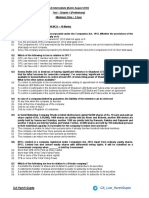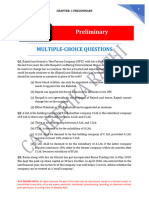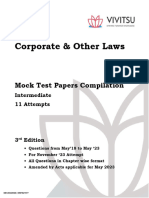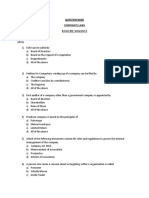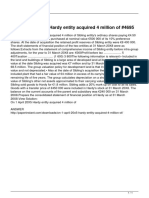Questions & Answers
Chapter 1 : Preliminary
Compiled by CA DEEPIKA RATHI
CA DEEPIKA RATHI 1
�Question 1 : The paid-up share capital of Altar Private Limited is Rs.1 crore, consisting of 8 lacs Equity Shares of
Rs. 10 each, fully paid-up and 2 lacs Cumulative Preference Shares of Rs. 10 each, fully paid-up. New Private
Limited and Ultra Private Limited are holding 3 lacs Equity Shares and 50,000 Equity Shares respectively in Altar
Private Limited. New Private Limited and Ultra Private Limited are the subsidiaries of PQR Private Limited.
With reference to the provisions of the Companies Act, 2013 examine whether Altar Private Limited is a
subsidiary of PQR Private Limited? Would your answer be different if PQR Private Limited has 8 out of 9
Directors on the Board of Altar Private Limited? [RTP NOV 2019]
Answer 1 : In terms of section 2 (87) of the Companies Act 2013 "subsidiary company" or "subsidiary", in
relation to any other company (that is to say the holding company), means a company in which the holding
company :-
i. controls the composition of the Board of Directors or
ii. exercises or controls more than one-half of the total voting power either at its own or together with one
or more of its subsidiary companies
Explanation—For the purposes of this clause
a. a company shall be deemed to be a subsidiary company of the holding company even if the control referred
to in sub-clause (i) or sub-clause (ii) is of another subsidiary company of the holding company.
CA DEEPIKA RATHI 2
�b. the composition of a company's Board of Directors shall be deemed to be controlled by another company
if that other company by exercise of some power exercisable by it at its discretion can appoint or remove
all or a majority of the directors.
In the present case, New Pvt. Ltd. and Ultra Pvt. Ltd. together hold less than one half of the total share capital
i.e. less than one-half of total voting power. Hence, PQR Private Ltd. (holding of New Pvt. Ltd. and Ultra Pvt. Ltd)
will not be a holding company of Altar Pvt. Ltd.
However, if PQR Pvt. Ltd. has 8 out of 9 Directors on the Board of Altar Pvt. Ltd. i.e. controls the composition of
the Board of Directors; it (PQR Pvt. Ltd.) will be treated as the holding company of Altar Pvt. Ltd.
Question 2 : Following are some of the securities, issued by different companies related with each other, as follows:-
Company Securities Issued Remarks
Kleshrahit Ltd. Listed non-convertible redeemable preference shares
Has the power to appoint 2/3rd
issued on private placement basis in terms of relevant directors in Indriyadaman Ltd.
SEBI Regulations.
Indriyadaman Ltd. Listed non-convertible debt securities issued on private Holding 60% voting power inSajagta (P) Ltd.
placement basis in terms of relevant SEBI Regulations.
Sajagta (P) Ltd. Listed non-convertible debt securities issued on private The company holds 52% equity shares in Pratibodh
placement basis in terms of relevant SEBI Regulations. Ltd. as an investment on behalf of another company
in a capacity of a trustee.
CA DEEPIKA RATHI 3
�Equity shares issued by the Kleshrahit Ltd. and Indriyadaman Ltd. are not listed in any of the recognized stock exchanges.
In the context of aforesaid facts, answer the following question(s):-
a. Whether the aforesaid companies can be considered as listed company(ies)?
b. Explain the relationship between the aforesaid companies? [RTP MAY 2022]
Answer 2 :
a. According to section 2(52) of the Companies Act, 2013, listed company means a company which has any of its securities
listed on any recognized stock exchange.
Provided that such class of companies, which have listed or intend to list such class of securities, as may be prescribed in
consultation with the Securities and Exchange Board, shall not be considered as listed companies.
According to rule 2A of the Companies (Specification of definitions details) Rules, 2014, the following classes of
companies shall not be considered as listed companies, namely :-
a. Public companies which have not listed their equity shares on a recognized stock exchange but have listed their-
i. non-convertible debt securities issued on private placement basis in terms of SEBI (Issue and Listing of Debt
Securities) Regulations, 2008 or
ii. non-convertible redeemable preference shares issued on private placement basis in terms of SEBI (Issue and
Listing of Non-Convertible Redeemable Preference Shares) Regulations, 2013; or
iii. both categories of (i) and (ii) above.
CA DEEPIKA RATHI 4
� b. Private companies which have listed their non-convertible debt securities on private placement basis on a
recognized stock exchange in terms of SEBI (Issue and Listing of Debt Securities) Regulations, 2008.
c. Public companies which have not listed their equity shares on a recognized stock exchange but whose
equity shares are listed on a stock exchange in a jurisdiction as specified in sub-section (3) of section 23 of
the Act.
Company Name Analysis and Conclusion
Kleshrahit Ltd. Equity shares issued by the company are not listed. However, the company has issued listed non-
convertible redeemable preference shares issued on private placement basis in terms of relevant SEBI
Regulations which falls in the exceptions to the listed company, given as per clause (a)(ii) to Rule 2A,
as aforesaid, and accordingly, Kleshrahit Ltd. shall not be considered as a listed company.
Indriyadaman Equity shares issued by the company are not listed. However, the company has issued listed non-
Ltd. convertible debt securities issued on private placement basis in terms of relevant SEBI Regulations
which falls in the exceptions to the listed company, given as per clause (a)(i) to Rule 2A, as aforesaid,
and accordingly, IndriyadamanLtd. shall not be considered as a listed company.
Sajagta (P) Ltd. The company has issued listed non-convertible debt securities issued on private placement basis on a
recognised Stock Exchange in terms of relevant SEBI Regulations which falls in the exceptions to the
listed company given as per clause (b) to Rule 2A, as aforesaid, and accordingly, Sajagta (P) Ltd. shall
not be considered as a listed company.
CA DEEPIKA RATHI 5
�b. According to section 2(46) of the Companies Act, 2013, holding company in relation to one or more other companies,
means a company of which such companies are subsidiary companies.
According to section 2(87) of the Companies Act, 2013, subsidiary company or subsidiary, in relation to any other
company (that is to say the holding company), means a company in which the holding company-
i. controls the composition of the Board of Directors or
ii. exercises or controls more than one-half of the total voting power either at its own or together with one or more of
its subsidiary companies.
Provided that such class or classes of holding companies as may be prescribed shall not have layers of subsidiaries
beyond such numbers as may be prescribed.
Explanation-For the purposes of this clause,-
a. a company shall be deemed to be a subsidiary company of the holding company even if the control referred to in
sub-clause (i) or sub-clause (ii) is of another subsidiary company of the holding company.
b. the composition of a company’s Board of Directors shall be deemed to be controlled by another company if that
other company by exercise of some power exercisable by it at its discretion can appoint or remove all or a majority of
the directors.
c. the expression “company” includes any body corporate
d. layer” in relation to a holding company means its subsidiary or subsidiaries; As per the notification dated 27th
December 2013, Ministry clarified that the shares held by a company or power exercisable by it in another company
CA DEEPIKA RATHI 6
�in a fiduciary capacity shall not be counted for the purpose of determining the holding – subsidiary relationship in
terms of the provision of section 2(87) of the Companies Act, 2013.
i. Relationship between Kleshrahit Ltd. & Indriyadaman Ltd .
It is given that Kleshrahit Ltd. has the power to appoint 2/3rd directors in Indriyadaman Ltd. i.e. majority of the
directors can be appointed by Kleshrahit Ltd.
Accordingly, as per sub-clause (i) to section 2(87) read with the Explanation given in point (b), it can be
understood that Indriyadaman Ltd. is the subsidiary company of Kleshrahit Ltd. while the latter is the holding
company of Indriyadaman Ltd.
ii. Relationship between Indriyadaman Ltd. & Sajagta (P) Ltd.
It is given that Indriyadaman Ltd. is holding 60% voting power in Sajagta Ltd
Accordingly, as per sub-clause (ii) to section 2(87), it can be understood that Sajagta (P) Ltd. is the subsidiary
company of Indriyadaman Ltd. while the latter is the holding company of Sajagta (P) Ltd. as Indriyadaman Ltd.
controls more than one-half of the total voting power of Sajagta (P) Ltd.
iii. Relationship between Kleshrahit Ltd. & Sajagta (P) Ltd.
It is given that Indriyadaman Ltd. is holding 60% voting power in Sajagta Ltd. and it has been derived that
Indriyadaman Ltd. is the subsidiary company of Kleshrahit Ltd. and Sajagta (P) Ltd. is the subsidiary company
of Indriyadaman Ltd., respectively.
CA DEEPIKA RATHI 7
� Accordingly, as per sub-clause (ii) to section 2(87) read with the Explanation given in point (a), that a company
shall be deemed to be a subsidiary company of the holding company even if the control is of another
subsidiary company of the holding company i.e. subsidiary of subsidiary company will be deemed to be a
subsidiary of the holding company.
Hence, it can be understood that Sajagta (P) Ltd. is deemed to be subsidiary company of Kleshrahit Ltd. while
the latter would be considered as the holding company of Sajagta (P) Ltd.
iv. Relationship between Sajagta (P) Ltd. & Pratibodh Ltd.
It is given that Sajagta (P) Ltd. holds 52% equity shares in Pratibodh Ltd. as an investment on behalf of
another company in a capacity of a trustee i.e. in a fiduciary capacity.
As per the notification dated 27th December 2013, Ministry (MCA) clarified that the shares held by a
company or power exercisable by it in another company in a fiduciary capacity shall not be counted for the
purpose of determining the holding–subsidiary relationship in terms of the provision of section 2(87) of the
Companies Act, 2013.
Accordingly, Sajagta (P) Ltd. & Pratibodh Ltd. do not share any holding– subsidiary relationship as the former
holds shares in latter just in a fiduciary capacity on behalf of another company.
CA DEEPIKA RATHI 8
�Question 3 : MNP Private Ltd. is a company registered under the Companies Act, 2013 with a, Paid up Share Capital of
Rs.45 lakh and turnover of Rs.3 crores. Explain the meaning of the "Small Company" and examine the following in accordance
with the provisions of the Companies Act, 2013
i. Whether the MNP Private Ltd. can avail the status of small company?
Answer 3 : Small Company: According to Section 2(85) of the Companies Act, 2013, Small Company means a company,
other than a public company
i. paid-up share capital of which does not exceed fifty lakh rupees or such higher amount as may be prescribed
which shall not be more than ten crore rupees; and
ii. turnover of which as per its last profit and loss account for the immediately preceding financial year does not exceed
two crore rupees or such higher amount as may be prescribed which shall not be more than one hundred crore
rupees.
Nothing in this clause shall apply to-
A. a holding company or a subsidiary company
B. a company registered under section 8 or
C. a company or body corporate governed by any special Act.
CA DEEPIKA RATHI 9
�As per Rule 2(1)(t) of Companies ( Specification of Definitions Details) Rules, 2014 Paid up Capital and
Turnover of the Small company shall not exceed Rupees 2 crores and Rupees 20 crores respectively.
i. In the present case, MNP Private Ltd., a company registered under the Companies Act, 2013 with a
paid up share capital of Rs.45 lakh and having turnover of Rs.3 crore.
Since both the criteria of share capital a n d the second criteria of turnover is met and the
provisions require both the criteria to be met in order to avail the status of a small company,
MNP Ltd. can avail thestatus of small company.
CA DEEPIKA RATHI 10
�Question 4 : Kavya Ltd. has a paid up share-capital of Rs. 80 crores. Amjali Ltd. holds a total of Rs. 50 crores of Kavya
Ltd. Now, Kavya ltd. is making huge profits and wants to expand its business and is aiming at investing in Amjali Ltd. Kavya
Ltd. has approached you to analyse whether as per the provisions of the Companies Act, 2013, they can hold 1/10th of the
share capital of Amjali Ltd. [MTP MAY 2021]
Answer 4 : In terms of section 2 (87) of the Companies Act 2013 "subsidiary company" or "subsidiary", in relation to
any other company (that is to say the holding company), means a company in which the holding company-
i. controls the composition of the Board of Directors or
ii. exercises or controls more than one-half of the total voting power either at its own or together with one or more of its
subsidiary companies.
Provided that such class or classes of holding companies as may be prescribed shall not have layers of subsidiaries
beyond such numbers as may be prescribed.
Since, Kavya ltd. is holding more than one half (50 crores out of 80 crores) of the total share capital of Kavya Ltd., it (Amjali
Ltd.) is holding of Kavya Ltd.
Further, as per the provisions of section 19 of the Companies Act, 2013, no company shall, either by itself or through its
nominees, hold any shares in its holding company and no holding company
shall allot or transfer its shares to any of its subsidiary companies and any such allotment or transfer of shares of a
company to its subsidiary company shall be void:
CA DEEPIKA RATHI 11
�Provided that nothing in this sub-section shall apply to a case-
a) where the subsidiary company holds such shares as the legal representative of a deceased member of the holding
company or
b) where the subsidiary company holds such shares as a trustee or
c) where the subsidiary company is a shareholder even before it became a subsidiary company of the holding company
In the given question, Kavya ltd. cannot acquire the shares of Amjali Ltd. as the acquisition of shares does not fall within
the ambit of any of the exceptions provided in section 19.
CA DEEPIKA RATHI 12
�Question 5 : New Private Ltd. is a company registered under the Companies Act, 2013 with a paid -up share capital of
Rs.70 lakh and turnover of Rs.30 crores. Explain the meaning of the “Small Company” and examine the following in
accordance with the provisions of the Companies Act, 2013.
i. Whether the New Private Ltd. can avail the status of small company?
ii. What will be your answer if the turnover of the company is Rs.15 crore and the capital is same as Rs.70 lakh? [MTP
MAY 2021]
Answer 5 : Small Company: According to Section 2(85) of the Companies Act, 2013, Small Company means a company,
other than a public company-
i. paid-up share capital of which does not exceed fifty lakh rupees or such higher amount as may be prescribed which
shall not be more than ten crore rupees; and
ii. turnover of which as per its last profit and loss account does not exceed two crore rupees or such higher amount as
may be prescribed which shall not be more than one hundred crore rupees.
Nothing in this clause shall apply to—
A. a holding company or a subsidiary company
B. a company registered under section 8; or
C. a company or body corporate governed by any special Act.
CA DEEPIKA RATHI 13
�As per the Companies (Specification of Definitions Details) Rules, 2014, for the purposes of sub -clause (i) and sub-clause (ii)
of clause (85) of section 2 of the Act, paid up capital and turnover of the small company shall not exceed rupees two
crores and rupees twenty crores respectively.
1. In the present case, New Private Ltd., a company registered under the Companies Act, 2013 with a paid up share capital
of Rs.70 lakh and having turnover of Rs.30 crore. Since, only one criteria of share capital not exceeding Rs.2 crores is
met, but the second criteria of turnover not exceeding Rs.20 crores is not met and the provisions require both the
criteria to be met in order to avail the status of a small company, New Private Ltd. cannot avail the status of small
company.
2. If the turnover of the company is Rs. 15 crore, then both the criteria will be fulfilled and New Private Ltd. can avail the
status of small company.
Question 6 : Kapila Limited issued equity shares of Rs. 1,00,000 (10,000 shares of Rs.10 each) on 01.04.2021 which
have been fully subscribed, whereby Kusha Limited holds 4000 shares and Prem Limited holds 2000 shares in Kapila Limited.
Kapila Limited is also holding 20% equity shares of Red Limited before the date of issue of equity shares stated above. Red
Limited controls the composition of Board of Directors of Kusha Limited and Prem Limited from 01.08.2021. Examine with
relevant provisions of the Companies Act, 2013:
i. Whether Kapila Limited is a subsidiary of Red Limited?
ii. Whether Kapila Limited can hold shares of Red Limited? [MTP MAY 2022]
CA DEEPIKA RATHI 14
�Answer 6 : This given problem is based on sub-clause (87) of Clause 2 read with section 19 of the Companies Act, 2013.
As per sub-clause (87) of Clause 2 of the Companies Act, 2013 "subsidiary company" or "subsidiary", in relation to any other
company (i.e., the holding company), means a company in which the holding company-
i. controls the composition of the Board of Directors; or
ii. exercises or controls more than one-half of the total voting power either at its own or together with one or more of its
subsidiary companies.
For the purposes of this clause, Explanation is given providing that a company shall be deemed to be a subsidiary company
of the holding company even if the control referred to in point (i) or point (ii) above, is of another subsidiary company of
the holding company.
Whereas section 19 provides that, no company shall, hold any shares in its holding company and no holding company shall
allot or transfer its shares to any of its subsidiary companies and any such allotment or transfer of shares of a company to its
subsidiary company shall be void.
Provided that nothing in this sub-section shall apply to a case where the subsidiary company is a shareholder even before it
became a subsidiary company of the holding company.
Here in the instant case, Kapila Limited issued 10,000 equity shares on 1.4.2021 whereby Kusha Limited & Prem Limited holds
4000 & 2000 shares respectively in Kapila Ltd., Considering 1 share = 1 vote, Kusha Limited and Prem Limited together
holds more than one-half (50%) of the total voting power. Therefore, Kapila Limited will be subsidiary to Kusha Limited &
Prem Limited from 1.4.2021.
CA DEEPIKA RATHI 15
�Whereas Kapila Limited is already holding 20% equity shares of Red Limited before the date of issue of equity shares i.e.
1.4.2021.
Further, Red Limited controls the composition of Board of Directors of Kusha Limited and Prem Limited from 01.08.2021. In
the light of sub-clause (87) of Clause 2, Red Limited is a holding company of Kusha Limited and Prem Limited (Subsidiary
companies).
Following are the answers to the questions:
i. Yes, Kapila Limited is a subsidiary of Red Limited. In this case Kapila Limited shall be deemed to be a subsidiary company
of the holding company ( Red Limited) as Red Limited controls the composition of subsidiary companies Kusha Limited
& Prem Limited as per explanation to sub-clause (87) of Clause 2.
ii. Yes, Kapila Limited can hold shares of Red Limited. In this case Kapila Limited is a subsidiary of Red Limited as Kapila
Limited was holding 20% of equity shares of Red Limited even before it became a subsidiary company of the Red
Limited (i.e. on 01.08.2021), according to the exception to section 19.
Question 7 : AJD Pvt. Ltd. is having paid up share capital of Rs. 45 Lakhs and annual turnover of Rs. 185 Lacs. It is a
wholly owned subsidiary of K Ltd.- a listed company. Can AJD Pvt. Ltd. be called a small company as per the provisions of
the Companies Act, 2013. [MTP MAY 2022]
Answer 7 : As per Section 2(85) of the Companies Act 2013 read with Rule 2(1)(t) of the Companies (Specification of
definitions Details) Rules, 2014, “Small Company’’ means a company, other thana public company, having-
CA DEEPIKA RATHI 16
�i. paid-up share capital of which does not exceed two crores rupees; and
ii. turnover of which as per profit and loss account for the immediately preceding financial year does not exceed twenty
crore rupees.
As per Rule 2(1)(t) of Companies ( Specification of Definitions Details) Rules, 2014 Paid up Capital and Turnover of the
Small company shall not exceed Rupees 2 crores and Rupees 20 crores respectively.
Provided that nothing in this clause shall apply to-
A. a holding company or a subsidiary company;
B. a company registered under section 8; or
C. a company or body corporate governed by any special Act;
In the given case, AJD Pvt. Ltd. satisfies the turnover and paid up share capital criteria to be small company, but being a
subsidiary of K Ltd (a listed), it falls under the exclusions to the definition and hence is not a small Company.
CA DEEPIKA RATHI 17














